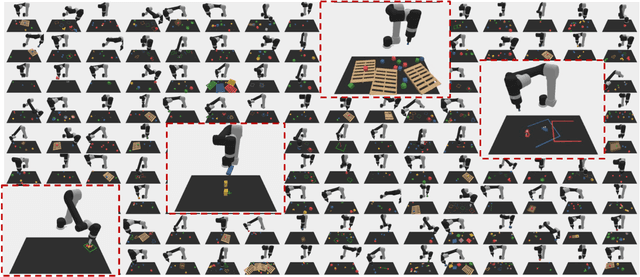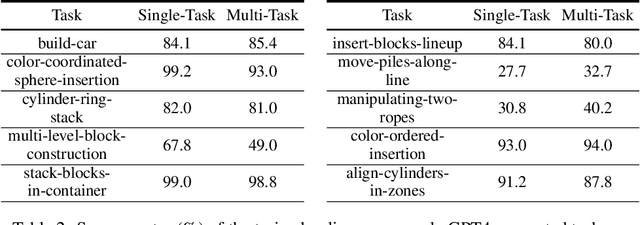Yiyang Ling
IMPACT: Intelligent Motion Planning with Acceptable Contact Trajectories via Vision-Language Models
Mar 13, 2025



Abstract:Motion planning involves determining a sequence of robot configurations to reach a desired pose, subject to movement and safety constraints. Traditional motion planning finds collision-free paths, but this is overly restrictive in clutter, where it may not be possible for a robot to accomplish a task without contact. In addition, contacts range from relatively benign (e.g., brushing a soft pillow) to more dangerous (e.g., toppling a glass vase). Due to this diversity, it is difficult to characterize which contacts may be acceptable or unacceptable. In this paper, we propose IMPACT, a novel motion planning framework that uses Vision-Language Models (VLMs) to infer environment semantics, identifying which parts of the environment can best tolerate contact based on object properties and locations. Our approach uses the VLM's outputs to produce a dense 3D "cost map" that encodes contact tolerances and seamlessly integrates with standard motion planners. We perform experiments using 20 simulation and 10 real-world scenes and assess using task success rate, object displacements, and feedback from human evaluators. Our results over 3620 simulation and 200 real-world trials suggest that IMPACT enables efficient contact-rich motion planning in cluttered settings while outperforming alternative methods and ablations. Supplementary material is available at https://impact-planning.github.io/.
GenSim: Generating Robotic Simulation Tasks via Large Language Models
Oct 02, 2023



Abstract:Collecting large amounts of real-world interaction data to train general robotic policies is often prohibitively expensive, thus motivating the use of simulation data. However, existing methods for data generation have generally focused on scene-level diversity (e.g., object instances and poses) rather than task-level diversity, due to the human effort required to come up with and verify novel tasks. This has made it challenging for policies trained on simulation data to demonstrate significant task-level generalization. In this paper, we propose to automatically generate rich simulation environments and expert demonstrations by exploiting a large language models' (LLM) grounding and coding ability. Our approach, dubbed GenSim, has two modes: goal-directed generation, wherein a target task is given to the LLM and the LLM proposes a task curriculum to solve the target task, and exploratory generation, wherein the LLM bootstraps from previous tasks and iteratively proposes novel tasks that would be helpful in solving more complex tasks. We use GPT4 to expand the existing benchmark by ten times to over 100 tasks, on which we conduct supervised finetuning and evaluate several LLMs including finetuned GPTs and Code Llama on code generation for robotic simulation tasks. Furthermore, we observe that LLMs-generated simulation programs can enhance task-level generalization significantly when used for multitask policy training. We further find that with minimal sim-to-real adaptation, the multitask policies pretrained on GPT4-generated simulation tasks exhibit stronger transfer to unseen long-horizon tasks in the real world and outperform baselines by 25%. See the project website (https://liruiw.github.io/gensim) for code, demos, and videos.
 Add to Chrome
Add to Chrome Add to Firefox
Add to Firefox Add to Edge
Add to Edge